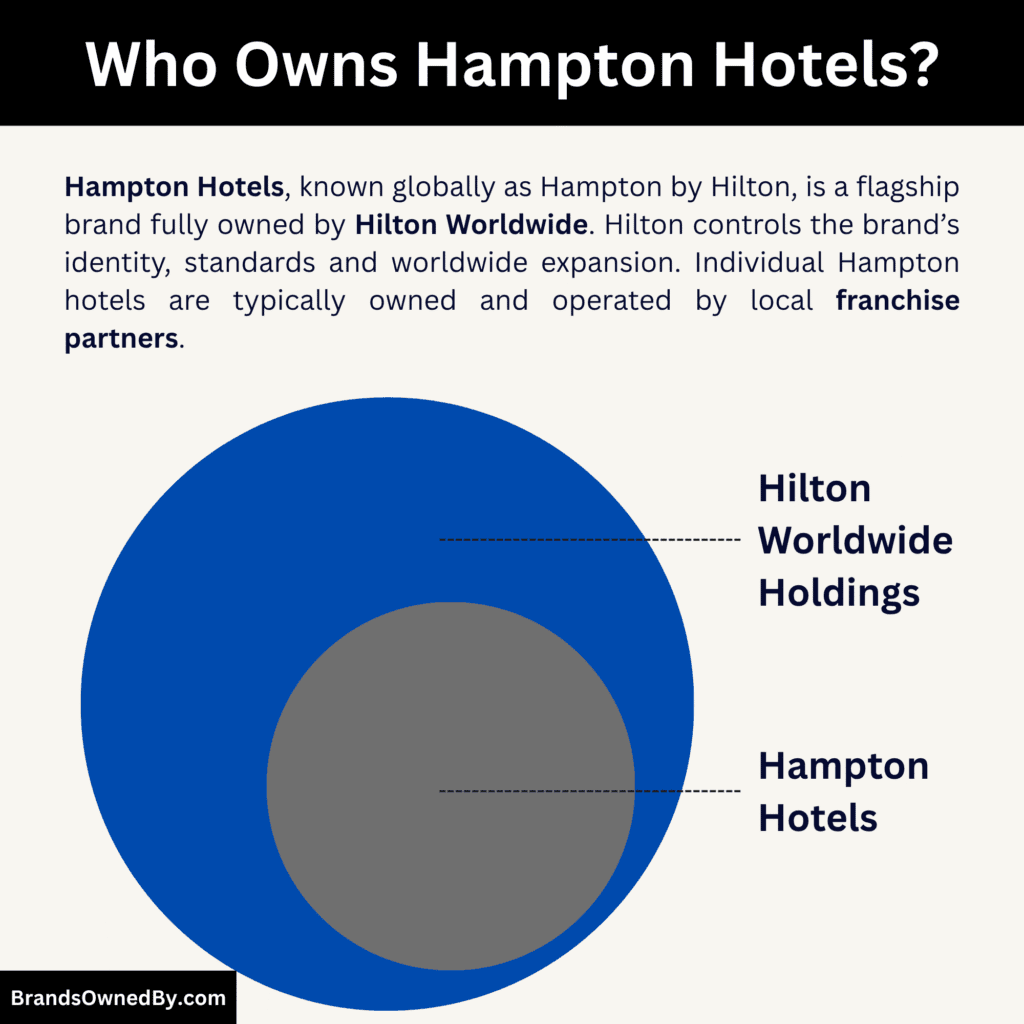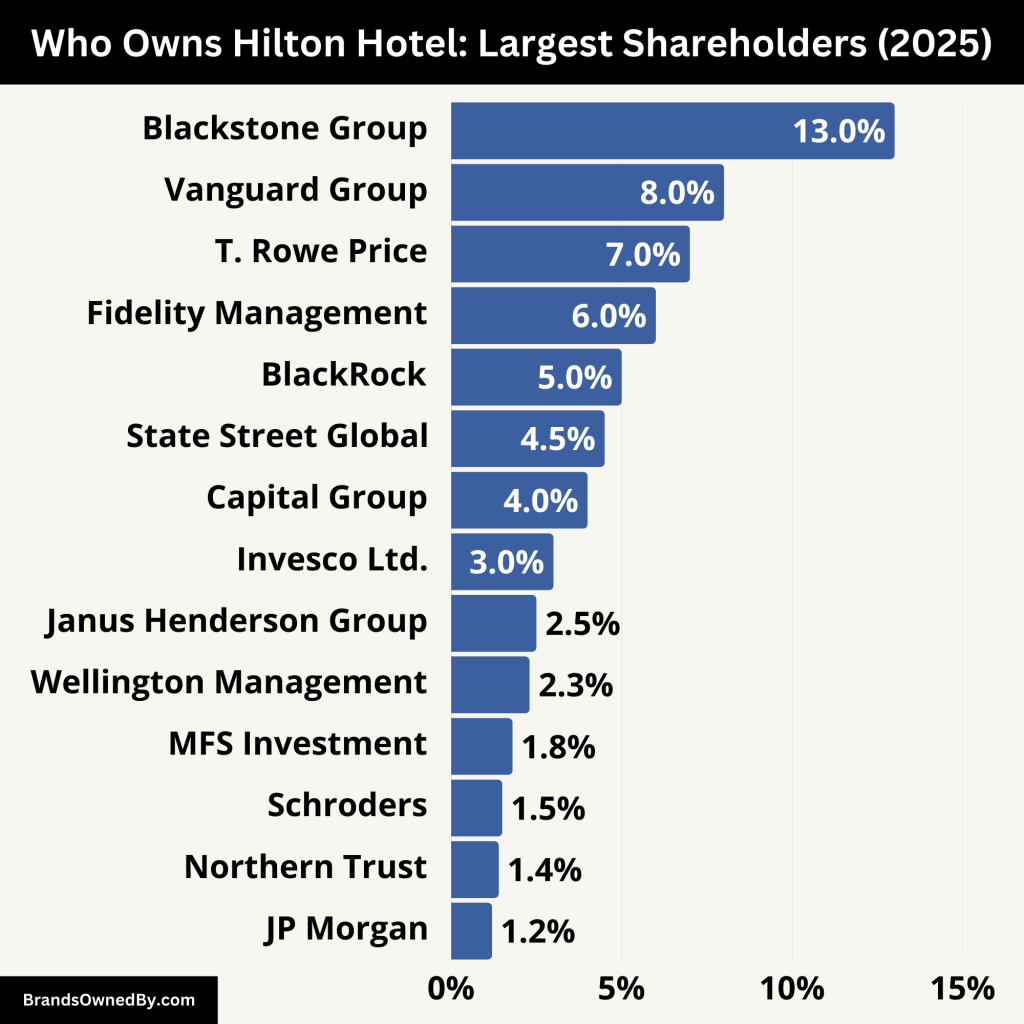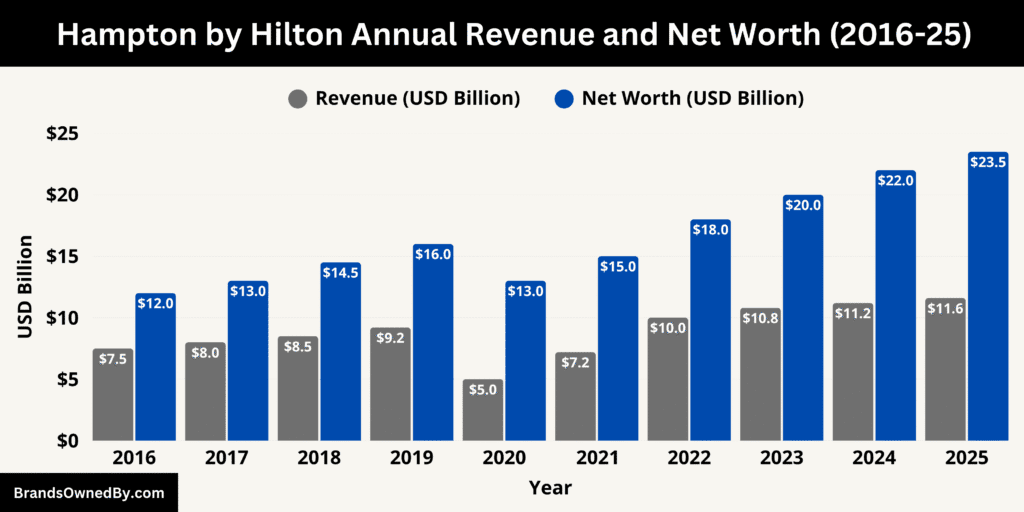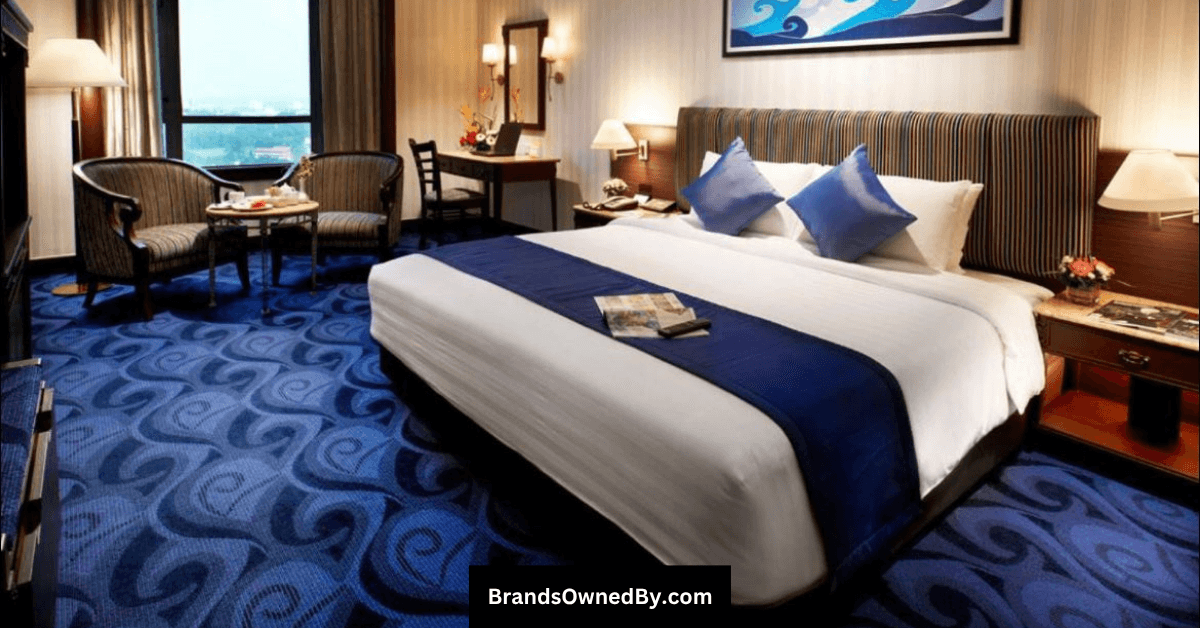If you’re wondering who owns Hampton Hotels — or more precisely, the hotel brand Hampton by Hilton — you’ve come to the right place. This article dives into the brand itself: its history, business model, ownership structure, and what makes it tick.
Key Takeaways
- Hampton Hotels is owned by Hilton Worldwide Holdings Inc., which controls the brand, operational standards, and global growth strategy.
- Hilton acquired Hampton in 1999 when it purchased Promus Hotel Corporation in a multibillion-dollar deal that brought Hampton into Hilton’s brand portfolio.
- Most Hampton hotel properties are owned and operated by franchisees, while Hilton owns the Hampton brand and provides systems, support, and quality oversight.
- Hampton remains a major growth engine for Hilton, expanding worldwide through its strong franchise model and well-recognized brand identity.
Hampton by Hilton Overview
Hampton by Hilton is a global hotel brand known for offering a consistent, dependable stay across a wide network of properties. From affordable fare to reliable comfort, the brand focuses on delivering the essentials: clean rooms, free hot breakfast, free Wi-Fi, and a friendly, welcoming service.
It appeals to both business and leisure travelers who value value and simplicity. The brand has grown into one of the largest hotel chains worldwide in its category with thousands of locations spanning dozens of countries and continents. Its emphasis is less on luxury frills and more on delivering what guests need — every time.
Founders
Hampton by Hilton originated as the brand “Hampton Inn” in the United States. It was established by Holiday Corporation in 1984, when the first Hampton Inn property opened in Memphis, Tennessee.
The initial model: a modest two-story building with 128 guest rooms and exterior entrances, created to address a gap between economy motels and full-service hotels.
The brand quickly became known for innovations such as offering free hot breakfast and introducing a “100 % satisfaction guarantee”.
In the late 1980s, Holiday Corporation reorganized its hospitality interests and spun off several brands into a new entity, Promus Hotel Corporation, under which Hampton became one of the flagship lines alongside other hotel brands.
In 1999, Hampton’s parent (Promus) was acquired by Hilton Worldwide Holdings Inc., bringing the Hampton brand into the Hilton global portfolio and allowing for international expansion and stronger franchising growth.
Major milestones
- 1984: Launch of the first Hampton Inn hotel in Memphis, Tennessee.
- 1989: Introduction of the “100 % satisfaction guarantee” for guests under the Hampton brand.
- 1990: Brand reaches over 220 properties and more than 27,000 rooms in its early phase.
- 1995: Launch of “Hampton Inn & Suites,” offering suite-style rooms with living-area amenities.
- 1999: Acquisition of Hampton’s parent (Promus Hotel Corporation) by Hilton Worldwide Holdings Inc., bringing Hampton into Hilton’s global portfolio.
- 2004: Launch of the “Make It Hampton” initiative — major brand refresh including upgraded bedding, free high-speed Internet, and new alarm clocks.
- 2009: First European location of Hampton by Hilton opens (marking the transition to “by Hilton” naming in international markets).
- 2012-2013: Brand continues major redesigns (e.g., “Perfect Mix” lobby upgrades, room refreshes targeting younger travelers) and launches a global development pipeline.
- 2014-2015: Entry into China via a licensing agreement with a major local operator; expansion into new international markets including the Middle East.
- March 26, 2024: Hampton by Hilton reaches its 3,000th hotel globally, signaling its vast scale and international footprint.
- 2025 (Jan-Sep period): Hampton by Hilton celebrates its 40th anniversary of the brand launch in 1984; enters the African market with its first hotel in Sandton, South Africa; signs a licensing deal for 75 hotels in India; more than 800 hotels in development globally.
- Late 2023 – 2025: Introduction of a new prototype design for North America and global markets — focus on efficiency, user-friendly guest rooms, updated public spaces, and future-proofing the brand for the next decades.
Who Owns Hampton Hotels?

Hampton by Hilton is a privately developed hotel brand that is now owned by Hilton Worldwide Holdings Inc. Hilton owns the intellectual property, trademarks, brand systems, loyalty integration, and operational standards behind all Hampton-branded hotels. This means Hampton operates as a brand within Hilton’s portfolio, not as a separate corporation.
Decisions regarding strategy, design, brand development, and guest-experience standards are directed at Hilton’s corporate level.
While Hilton owns the Hampton brand, most individual Hampton hotel properties are owned by independent franchisees. Hilton provides the brand, reservation system, loyalty program access (Hilton Honors), mandated service standards, and ongoing operational support.
Franchise owners finance, build, or convert the hotel property, and operate it under a license agreement. This franchise-driven structure enables the large global footprint Hampton holds today, allowing each property to be locally owned while remaining globally consistent in amenities and quality.
Parent Company: Hilton Worldwide Holdings Inc.

Hilton Worldwide Holdings Inc. oversees Hampton, along with numerous other hotel brands operating in different price tiers. Hilton functions as a publicly listed company on the New York Stock Exchange (Ticker: HLT).
Corporate leadership — including the CEO, executive team, and board of directors — governs Hampton’s brand decisions, international market expansion, franchise approvals, and performance standards. Hampton sits within Hilton’s Focused Service category, which emphasizes reliability and comfort at moderate pricing.
Hilton’s stock is widely held by institutional investors, with a free-float structure reflecting public ownership via the stock market. Key shareholders (as of October 2025) include:
- The Vanguard Group, Inc., with approximately 8% of outstanding shares.
- BlackRock, Inc., holding about 5% of shares.
- Capital Research & Management Company, around 4%.
- Blackstone is near 13%.
These institutional owners influence board elections and proxy matters, but day-to-day operations are run by management. Retail shareholders and smaller funds hold the remainder of the public equity. Institutional ownership is high — reports estimate that over 59 % of Hilton’s stock is held by institutional investors.
Acquisition Insight: How Hilton Became the Owner
The brand Hampton originated in 1984 under Holiday Corporation as “Hampton Inn”. Later, the brand became part of Promus Hotel Corporation through corporate restructuring. Under Promus, Hampton gained momentum in the mid-scale limited-service lodging sector and built its reputation for free breakfast and standardized service.
The 1999 Transaction: Hilton Acquires Promus
In 1999, Hilton Hotels (predecessor to today’s Hilton Worldwide) agreed to acquire Promus Hotel Corporation in a deal valued at around $4 billion—which included cash, stock and assumed debt. The transaction terms included:
- $38.50 per share for Promus stock, paid partly in cash and partly in Hilton stock.
- The combined entity expected to assume approximately $5.4 billion in pro-forma debt at year-end 1999, including about $900 million of Promus debt.
Strategic Rationale and Post-Acquisition Impact
The acquisition expanded Hilton’s brand portfolio into the fast-growing mid-scale, limited-service lodging segment. It brought Hampton’s distribution, franchise model, and growth trajectory under Hilton’s umbrella. Post-transaction, Hilton aimed to leverage synergies in management fees, franchise growth, cost savings, and guest loyalty integration. The acquisition enabled the scaling of Hampton’s brand globally, backed by Hilton’s infrastructure.
Implications for Hampton’s Growth and Integration
As a result of the acquisition:
- Hampton was integrated into Hilton’s brand system and adopted the “by Hilton” naming convention in global markets.
- The brand leveraged Hilton’s loyalty program and global distribution network, accelerating its expansion beyond the U.S.
- Franchise expansion received greater development support and access to capital via Hilton’s platform.
- Hampton’s business model benefited from Hilton’s operational expertise, procurement, marketing, and brand management resources.
Legacy and Long-Term Ownership Stability
Since the 1999 acquisition, Hampton has remained part of Hilton’s core brand portfolio with stable ownership. The role of the parent company, franchise network and global standards has maintained continuity. Hampton hasn’t been spun off or sold; it continues to grow internationally under Hilton’s ownership. This stability has provided brand assurance for franchisees, investors, and guests alike.
Who is the CEO of Hampton by Hilton?
Hampton Hotels does not have a separate CEO apart from its parent company. The parent company, Hilton Worldwide Holdings Inc. (Hilton Worldwide), is led by CEO Christopher J. Nassetta, and thus has overall executive authority.
However, the brand itself is helmed more directly by Shruti Gandhi Buckley, who holds the title of Senior Vice President and Global Brand Leader for Hampton by Hilton and Spark by Hilton. She is responsible for the global strategy, growth, brand integrity and guest experience of Hampton.
Role & Responsibilities of Shruti Gandhi Buckley
Shruti Gandhi Buckley leads the Hampton brand at a global level. Her responsibilities include:
- Setting brand strategy for Hampton by Hilton — how it competes, how it grows, how it fits into the global hospitality marketplace.
- Overseeing guest experience standards: how Hampton hotels present themselves, what amenities they offer, how consistent the stay is.
- Collaborating with franchise partners and developers to expand the brand into new geographic markets, especially in emerging regions.
- Ensuring brand integrity and alignment with Hilton’s wider systems — loyalty, reservations, technology, guest data.
- Leading marketing and brand identity efforts, including design refreshes (for example Hampton’s updated prototype and visual identity).
Career & Experience
Before taking on the Hampton brand leadership role, Shruti Gandhi Buckley brought more than 25 years of experience in brand management, marketing leadership, global business roles, across industries such as luxury and consumer goods. She transitioned into hospitality and now applies that global branding expertise to Hampton and Spark.
Relation to Christopher J. Nassetta & Hilton Executive Leadership
While Shruti Gandhi Buckley is the brand leader for Hampton, the ultimate senior executive of Hilton Worldwide is Christopher J. Nassetta. He sets the overall company strategy, approves major brand directions, development decisions and global corporate initiatives that Hampton falls under. Thus, in the hierarchy:
- Nassetta is the CEO of Hilton Worldwide — oversees all brands including Hampton.
- Buckley is the brand head of Hampton by Hilton — responsible for day-to-day brand strategy and operations within the Hilton system.
This arrangement means Hampton does not have a standalone CEO, but is led within a well-established brand-leadership structure embedded in Hilton’s global framework.
Focused Impact for Hampton by Hilton
Under Buckley’s leadership, Hampton by Hilton has accelerated its growth and taken on new markets. For example:
- The brand celebrated its 3,000th hotel around early 2024 and continues to expand globally.
- The brand has rolled out updated visual identities, refreshed design prototypes, and pushed into new regions such as Africa and India.
- Her marketing and development strategy emphasizes Hampton as an owner-favorite brand and a trusted guest brand, reinforcing its value in franchise growth globally.
Hampton Hotels Annual Revenue and Net Worth

As of October 2025, Hampton Hotels plays a vital role within its parent company and contributes to the parent’s reported revenue of about $11.3 billion for the trailing twelve months, while the parent company’s market valuation stands at $62 billion. The net worth of Hampton Hotels, as of October 2025, is around $23.5 billion.
Revenue Generation and Brand Contribution
Hampton Hotels generates revenue primarily through two key streams: franchise and management fees paid by independent hotel owners for operating under the Hampton brand, and royalty/license fees collected based on room revenue at franchise properties.
Most Hampton locations are owned and operated by franchisees who pay the brand owner for access to the brand name, reservation systems, and loyalty program integration. Because Hampton is part of a larger parent company, its growth and development projects bolster the parent’s top line and feed into consolidated financial results.
For example, in the parent’s recent filings, management and franchise fee revenues increased by 6.6 % in the first half of 2025 compared to the same period a year earlier, which reflects brands like Hampton gaining traction.
The rapid unit growth of Hampton hotels across multiple continents means more hotels paying brand fees, more guest stays, and more consistent income streams feeding into the parent’s revenue base.
Net Worth and Valuation Implications for Hampton
As of October 2025, the net worth or brand value of Hampton Hotels is $23.5 billion.
This estimated brand value plays a major role in strengthening the overall financial position of the parent company. The parent’s market valuation of around $62 billion in October 2025 benefits significantly from Hampton’s rapid expansion and high brand equity in the mid-scale hospitality market. Hampton’s well-known reputation for reliable service and global presence makes it one of the most valuable brands under the parent’s portfolio.
The increase in Hampton’s estimated net worth over the past decade highlights its importance as a long-term growth engine.
The brand’s strong performance improves investor confidence for the parent company, enhances its valuation multiples, and supports strategic investment in new hotel openings worldwide. As more properties open and generate recurring royalty fees, Hampton’s implied net value continues to rise, reinforcing its position as one of the key contributors to the parent company’s financial strength.
Strategic Outlook and Importance
Hampton Hotels’ revenue and implied value are significant not just as current figures but for the future. Because the brand focuses on mid-scale and limited-service hotels, it can expand more quickly and cost-effectively than full-service luxury brands.
That growth drives new franchise fee revenues and enhances the parent company’s global presence. The brand’s contribution helps ensure the parent company can reinvest in technology, brand refreshes, and loyalty schemes, which in turn benefit Hampton locations.
Therefore, Hampton Hotels is more than just one brand in the portfolio—it is a key growth engine propping up both revenue and valuation for the parent company.
Brands Owned By Hampton by Hilton
Below is a list of the major brands, entities, and programs owned by Hampton as of October 2025:
Hampton Inn
Hampton Inn is the core brand within the Hampton portfolio. It focuses on upper mid-scale, limited-service accommodations providing free hot breakfast, free Wi-Fi and consistent stay standards. These hotels are mostly franchised and cater to both leisure and business travelers seeking comfort without premium luxury pricing. Rooms are designed for functionality and efficiency, and locations are concentrated near highways, airports and suburban business districts.
Hampton Inn & Suites
Hampton Inn & Suites expands the guest experience by offering larger suite-style accommodations. These properties provide more space, often including kitchenettes or extended seating areas suitable for longer stays or families needing additional room. The brand variation attracts corporate travelers staying multiple nights and leisure visitors seeking extra comfort while maintaining affordability.
Hampton Management Services
Some Hampton properties are not run by franchisees but instead are managed directly under Hilton’s operational arm as part of Hampton’s branded service structure. These hotels operate under Hampton brand standards but receive corporate training, staffing support, revenue management and brand oversight directly through the system. This structure ensures brand consistency even when ownership varies.
Hampton Franchise Network
The Hampton franchise system is a large operational entity on its own. Franchise owners license the Hampton name, design standards and service requirements. Hampton’s franchise ecosystem also includes mandatory involvement in global marketing programs, quality assurance audits, brand upgrade initiatives and access to centralized reservation technology. This network is one of the largest in the mid-scale lodging segment globally and acts like a distributed ownership model under Hampton’s control standards.
Hampton Brand Programs and Guest Experience Entities
Hampton operates specific branded programs that function as extensions of the brand itself. This includes the signature hot breakfast program, standardized bedding and room-comfort initiatives, and the “100% Hampton Guarantee” which ensures guest satisfaction as a core operational entity. These programs also include brand-level marketing, interior design standards, and uniform guest-experience expectations across every Hampton hotel.
Development and Growth Partnerships
Hampton enters into development licensing and operational agreements with third-party entities, especially in international markets. These are not owned brands but are closely tied to Hampton’s brand network and expansion model. They ensure that Hampton has direct influence over development guidelines, architecture approvals, and quality audits while being able to rapidly grow its portfolio using local investment partners.
Final Thoughts
Understanding who owns Hampton Hotels provides a clear view of how the brand operates across the world. Hampton by Hilton continues to grow under a stable ownership and franchise-based structure, delivering the same dependable comfort and friendly service that travelers expect. With strong brand leadership, consistent standards, and a global network of dedicated franchise owners, Hampton Hotels remains a trusted choice for guests seeking reliable stays wherever they go.
FAQs
Who owns Hampton Inn hotels?
Hampton Inn hotels are owned as a brand by Hilton Worldwide Holdings Inc., while most individual hotel properties are operated by independent franchise owners.
Who is the parent company of Hampton?
The parent company of Hampton is Hilton Worldwide Holdings Inc.
Is Hampton owned by Hilton?
Yes, Hampton is fully owned by Hilton Worldwide and operates as part of Hilton’s global portfolio of hotel brands.
What company owns Hampton Inn?
Hampton Inn is owned by Hilton Worldwide Holdings Inc., which manages the brand name, systems, and standards worldwide.
Does Marriott own Hampton Inn?
No. Hampton Inn is not owned by Marriott. It is a Hilton brand.
Who is the CEO of Hampton by Hilton?
Hampton by Hilton does not have a separate CEO. The brand is led by Hilton’s corporate executive team under CEO Christopher J. Nassetta, with daily brand management overseen by the Global Brand Leader for Hampton.

